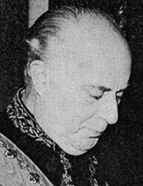

It took three attempts before he finally started his diplomatic career (11 October 1941). Teixeira de Sampaio, who previously disliked him greatly, eventually accepted him. Brazão even collaborated with him on the revision of the letters of Father António Vieira, from the Arquivo Cadaval, managing to convince the Ocidente journal to publish them. It was during these three years at the Ministry that he was personally acquainted with Salazar. He had a deep admiration for him though, as time went on, he would ultimately grieve, 'seeing him continue on, past the moment he should have left with glory" (Memorial, p. 309). Shortly before the end of the war, he was posted as Second Secretary to the Embassy of Portugal at the Holy See under express orders from the Secretary-General not to handle historical documents. He needed to be otherwise engaged in the preparation of his diplomatic career (Memorial, p. 217). In Europe in 1945, almost everything was in ruins. In Italy there was little to buy, except books, true bibliographic treasures that enriched the valuable library he gathered throughout his lifetime. He then went to Madrid, followed by Hong Kong. There he encountered a large community of about 5,000 descendants of the first Portuguese to settle in China, who had gone through the difficult times of war without any support from the Portuguese government. His primary concern was to retrieve lost ties with the Portuguese community, starting with the unifying factors of national sentiment - language and culture - while deepening collaboration with the British and the Chinese. On the eve of his departure, the local press and the Governor of Hong Kong gave him highest praise. He was greatly disappointed upon returning to Lisbon, after five years of struggle under a terrible climate, to not receive any expression of gratitude for his "Portuguese patriotism that did not wane with distance" (Memorial, p. 243).
After being Chargé d'Affaires in Dublin (1951-55) and having passed the exam for Counsellor, he was invited by Paulo Cunha to be Head of the State Protocol (28 September 1955). He did not warm to this post. In his memoirs he says that in the barely one year he held the role, he was "truly surprised at the spectacle of human vanity. It was even more worthless than I thought! "(Memorial, p. 271).
